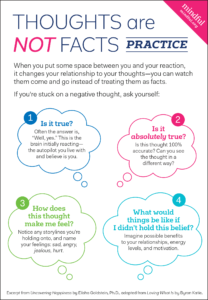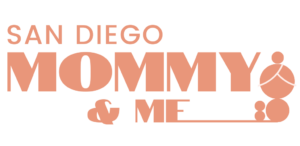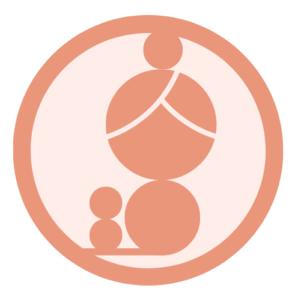Understanding Your Experience
Last week we talked about fact that motherhood is full of complex and often conflicting emotions and the importance of honoring or accepting our full experience.
This week we going to pause to expand on the reoccurring theme within that theme:
Motherhood is MUCH harder than expected.
Key word being, EXPECTED.
Expectations are what we think will happen, while reality is what actually transpires.
While we hope these two will match up, they often don’t. This disparity of expectations vs. reality often leads to feelings of discontentment and unhappiness.
So, can we simply avoid having expectations?
In short, no.
Expectations* are normal, automatic, largely out of our awareness, and survive an important purpose in our everyday functioning.
*To keep things simple, by ‘expectations’ I also mean our beliefs, attitudes, biases, and cognitive schemes or narratives.
BUT we can get better at identifying and responding to them if/when they begin to cause pain and suffering. To do that we need to under how the brain works, and when we need to take our brains off autopilot.
Here is what you need to know:
The human brain is a meaning making machine.
The brain is designed to automatically and quickly evaluate and react to our surroundings and experiences. To do this, the brains is always paying attention (consciously + unconsciously) to sensory input and searching for patterns. It makes sense of these patterns by turning them into narrative stories to help us understand the world and anticipate the future. This process is not only essential to our survival, it provides us with a sense of control and safety.
Critical detail:
It is impossible for our big brains to process information thoroughly because we are bombarded with an infinite amount of sensory input every day. As a result, our brains sample/scan information, hold it briefly, construct meaning (i.e. the formation of expectations, beliefs, schemas, attitudes, etc.), and then discard the information.
Key take away:
For decades, research has found this automatic thought process responsible for widely influencing our perceptions, thoughts, and actions. Furthermore, because automatic thinking occurs outside of our conscious awareness, we frequently have no idea that it is occurring and influencing our judgments or behaviors.
Expectations are helpful, until they're not.
Statisticians have known for centuries that the brain’s frequent process of “educated guesses” is the optimal strategy for handling incoming information. Expectations serve us greatly throughout most basic day to day functions geared towards literal survival, BUT they can also inhibit our understanding of new information when it contradicts our predictions.
The brain is often an unreliable narrator.
We like to think we’re logical, rational human beings — but in reality, our brains are prone to hundreds of proven biases that cause us to think and act irrationally. In fact, thinking we’re rational despite evidence of irrationality in others is known as blind-spot bias!
To showcase the talents of the brain’s mental gymnastics, HERE is a complete list of the many cognitive biases we are capable of.
MOST IMPORTANTLY- Stressed out brains work harder to find/create meaning.
Research finds, if you take away the brains sense of control or understanding, the brain work twice as hard to fill in the gaps. In the absence of context, our brains fill in the rest. What we fill it in with is often byproduct of our own insecurities.
Meaning, left on autopilot, people are so instinctually hungry for patterns and connections (a sense of predictability and control) that our minds will just start making it up. The result is usually doubling down on one’s attempts to control the outcome at great personal expense.
Apparently, being totally responsible for a helpless, yet adorable little being that you love more than life itself, is an incredibly stressful situation. Who knew?! It might have been a while since your were new at something, but just like a brand new driver, you don’t have the luxury of running on autopilot. You’ll get there, but it’ll take time, practice, and a lot pep-talks.
Tips, Tools, & Tricks
Get in the habit of recognizing when you need to take your brain off autopilot. Along the same lines of observing and accepting your thoughts and emotions, when you notice you are especially reactive, stressed, or struggling, pause and spend some time trying to better understand what it is you are feeling and thinking and why it is so important to you.
Here’s how:
TIPS
When left on autopilot, we are guided by the notation that how we think and feel as if it is the absolute truth. HOWEVER, as I outlined above, the brain’s is imperfect and, as a result, our thought and feelings are not facts.
The bottom line: Thoughts and emotions are mental events that pop up in the mind and are dependent on our mood, circumstances, triggers, and expectations/beliefs/attitudes.
Next time your mind jumps to a conclusion that inevitably sends in you in a spiral toward depression or anxiety, pause and get curious about your “why?” Thoughts and emotions aren’t facts, but they are always a valid source of personal insight and awareness.
TOOLS

TRICKS
These some “red flags” that can help you recognize patterns of unrealistic expectations or problematic autopilot:
- You can shake feeling stressed and upset when things don’t go as planned or your routine deviates slightly.
- You find yourself being extra critical towards yourself and/or others.
- You fixate on small details and find it very important to get everything right.
- When things go wrong, even in minor ways, you get stuck in feeling let down and frustrated.
- You have very specific visions and find it difficult to accept other possible outcomes.
- When others don’t fall in line with your plans, you feel irritated and resentful.
Additional Deep Dives
Navigate your experience: Articles and resources related to topics covered in group.
The Goddess Myth- This Time article titled “Motherhood Is Hard to Get Wrong. So Why Do So Many Moms Feel So Bad About Themselves?” is a long but good read laying out our current idealized conception/themes surrounding what is means to be a “good mom.”
Breastfeeding – It takes two– HERE is an article that reviews America’s complicated history with baby feeding, HERE is an opinion piece that put into words the complex pressure of the current moment to breastfeed, and HERE a local UCSD professor provides a neutral look at the research/benefits. All in all, remember YOUR experience matters. Seek help/support and short weekly goals. For baby, YOU are best.
Navigating the “ShouldStorm”– We live in a culture of constant criticism, haunted by the idea that each choice can alter our child’s destiny forever. HERE Pediatrician Alison Escalante MD confirms the hard truth and provides with a clear, 3-step solution.
Motherhood is an Existential Crisis– The vulnerability you feel after becoming a mother can be crippling. HERE is a great article that puts words to this heavy emotional load. Naturally, a trauma or transitions of any kind can trigger this experience.
Never Say Never – It’s totally normal to have strong preferences or beliefs, but we must allow these image to change as needed by reality or demanded by baby. HERE is a fun article normalizing this.
Utilizing Our Emotions: Hard/negative emotions usually mean we are either tried/over-stressed or we’re emotionally triggered. Psychologist Susan Davis’s TED Talk outlines HOW to embrace and learn from these emotions in a healthy way.
Value-led decisions – Our thoughts and emotions are important, but they are not facts. Something, we need to work on unhooking/freeing ourselves from our thoughts, so we can make value-driven choices that better serve your individualized, big picture values/needs.
Time to Set the Narrative Straight.
Normalizing truth bombs:
Motherhood IS HARD.
In 1957 researcher EE La Master conducted a landmark study that found 83% of new parents reported going through a moderate to severe crisis in the transition to parenthood. Sadly, despite the significant size and skilled methodology of the study no one wanted to believe it. However, since then more than 16 other long-term studies have confirmed his findings. Yet, here we are, over 50 years later still maintaining the belief that having a new baby is the “happiest time of our lives.” We blame ourselves for the hard when it is very likely the EXPECTED reality of this significant and complex life experience and transition.
Motherhood has never been THIS hard.
Modern motherhood IS in fact notably more emotionally and labor intensive harder than it used to be.
One theory for this cultural shift was the creation of the term “Parenting” in the 70s that came with the rise of “parenting books” and parenting experts and a muti- billion-dollar industry revolving around how to raise children (aka parenting expectations).
This was largely driven by a new generation of women with very little baby experience, but a lot of work and school experience. Sound familiar?
Naturally, felt more comfortable “learning how to mom” from a book and approaching “parenting” like it was another task to be master.
The result, an ever-growing social belief and pressure that raising kids means being “child-centered, expert-guided, emotionally absorbing, labor-intensive, and financially expensive,” or risk your child falling behind in some way shape or form.
Research also shows this parental pressure largely falls on mom and comes at the expense of our sleep, career growth, time with friends and partner, leisure activities, and other life responsibilities.
Motherhood is made objectively harder by systemic limitations.
Looking at our experience within large context, or systems in which we live, research shows that each of these area has a significant effect on the mental, physical, and economic wellbeing of American families –
- Little to zero maternity & paternity leave
- The rising cost of living
- Lack of + cost of quality childcare
- Economic anxiety over increasing wealth gap
- Anxiety over the unknowns of the future
(i.e., not knowing what skills children will need) - Caring for aging parents
- Decreasing social and family support
- The digital age and information overload
- Societal expectations and changes
- Stigma or shame around talking about the hard/ societal pressure to be happy.
LASTLY… While motherhood has always been hard, our brains were NEVER prepared for handling what I like to call, information overload. We’ll begin to cover this piece of the puzzle next week!

